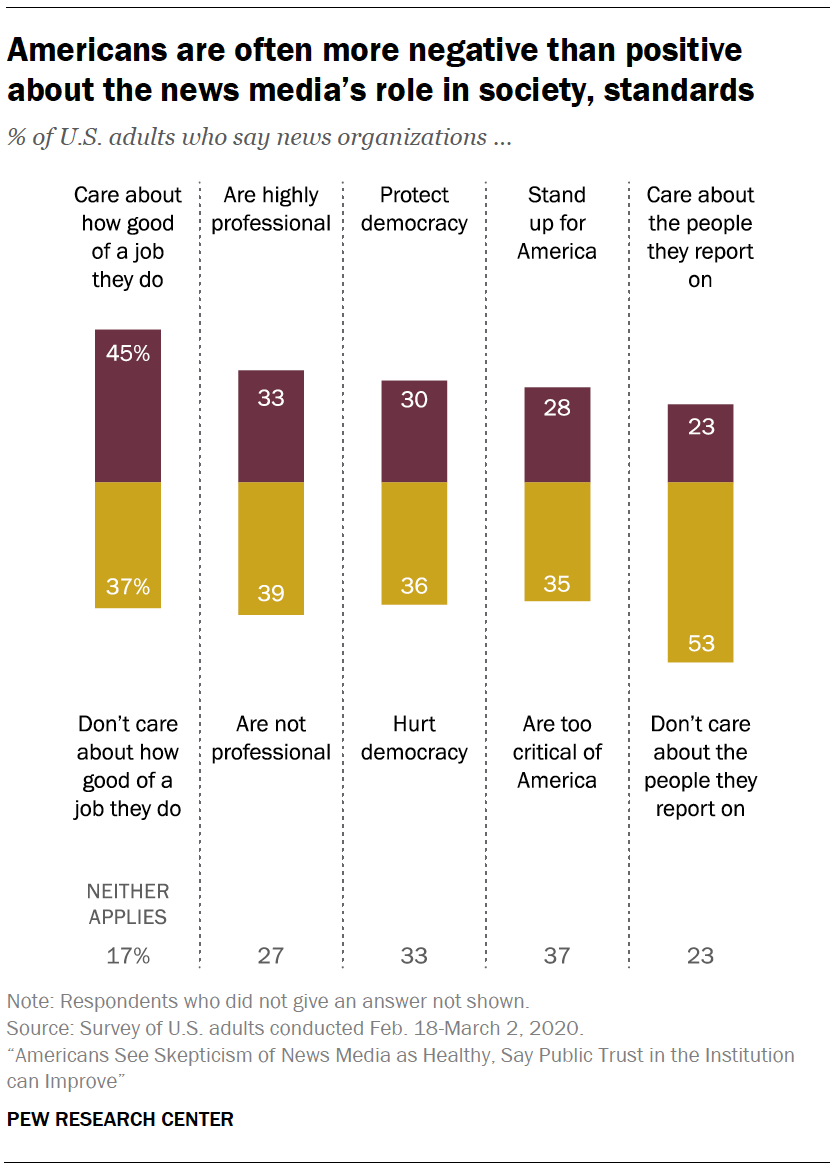 In general, Americans tend to express more negative than positive views about the news media and feel that that it is beneficial for society to approach the media with some level of skepticism. But the public does not view the media as a lost cause: A vast majority of U.S. adults say it is possible to increase their level of confidence in the institution.
In general, Americans tend to express more negative than positive views about the news media and feel that that it is beneficial for society to approach the media with some level of skepticism. But the public does not view the media as a lost cause: A vast majority of U.S. adults say it is possible to increase their level of confidence in the institution.
Americans have a number of specific reservations about the news media’s role, standards and impact on society. Respondents were asked to evaluate news organizations overall across five different dimensions: whether or not they care how good of a job they do; whether or not they act professionally; whether they protect or hurt democracy; whether they stand up for America or are too critical of the country; and whether or not they care about the people they report on.
Across these five areas, Americans rate only one more positively than negatively: whether news organizations care about how good of a job they do. Just under half (45%) say they do care, slightly higher than the share who say they do not (37%). The remaining 17% say neither statement reflects their views.
For the remaining four evaluations, Americans are more likely to hold a negative than positive view.1 One that particularly stands out is that many think news organizations lack empathy toward those they cover, with 53% saying news organizations do not care about the people they report on, 30 percentage points higher than the portion who says news outlets do care (23%).
There is some indication that these evaluations are more negative than in previous years. For example, Americans in 2013 were much more likely to say that news organizations were highly professional than not.2 Further, Americans think that trust more generally has declined in society.
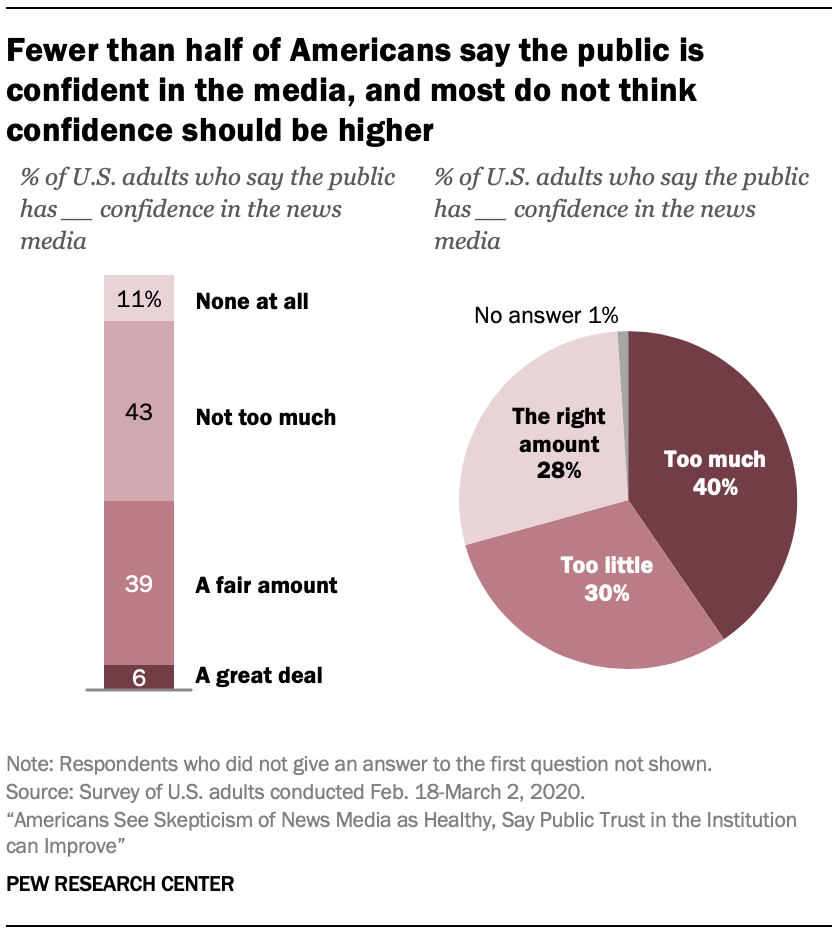 Americans’ reservations about the news media extend into the level of confidence they think the public overall has in the institution, as well as their own personal confidence. Fewer than half of U.S. adults (45%) say the public has at least a “fair amount” of confidence in journalists, including a mere 6% who think Americans trust the media “a great deal.” A slim majority says the public has either “not too much” confidence (43%) or no confidence at all (11%) in the news media.
Americans’ reservations about the news media extend into the level of confidence they think the public overall has in the institution, as well as their own personal confidence. Fewer than half of U.S. adults (45%) say the public has at least a “fair amount” of confidence in journalists, including a mere 6% who think Americans trust the media “a great deal.” A slim majority says the public has either “not too much” confidence (43%) or no confidence at all (11%) in the news media.
What’s more, relatively few think the public’s level of confidence in the news media should be higher. Most Americans say that the public either has too much (40%) or about the right amount (28%) of confidence in journalists, while just three-in-ten say the news media deserve more confidence.
There is little connection between views about how much confidence Americans do have in the news media and how much they say Americans should have. For instance, among those who think the public has at least a fair amount of confidence in journalists, four-in-ten say that it is too much. And among those who say the public has little to no trust in the media, an almost identical share – 41% – also say this level of confidence is higher than it should be.
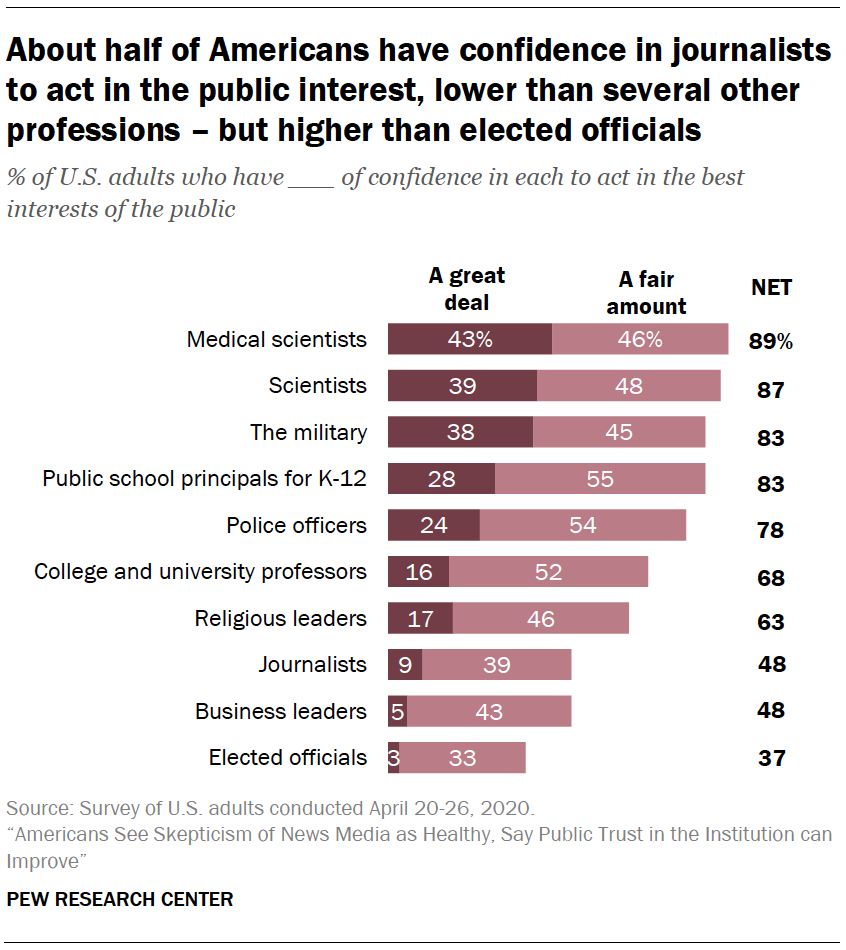 As reported earlier in this yearlong study, Americans also are somewhat split in their own levels of confidence in journalists. About half (48%) have at least a fair amount of confidence in journalists to act in the best interests of the public, while 51% say they have little to no confidence that this is the case. Faith in journalists is slightly down from late 2018, when 55% had at least a fair amount of confidence.
As reported earlier in this yearlong study, Americans also are somewhat split in their own levels of confidence in journalists. About half (48%) have at least a fair amount of confidence in journalists to act in the best interests of the public, while 51% say they have little to no confidence that this is the case. Faith in journalists is slightly down from late 2018, when 55% had at least a fair amount of confidence.
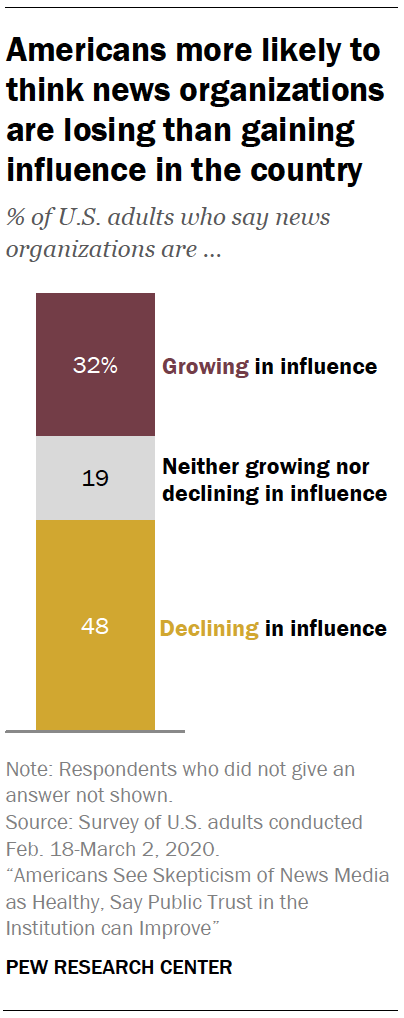
Journalists do not fare as well on this measure as several other groups of professionals. Of 10 groups asked about, seven received a higher level of confidence than journalists: medical scientists, scientists in general, the military, public school principals, police officers, college professors and religious leaders.3 Journalists rank higher than just one group – elected leaders – and are on par with business leaders.
Alongside these often negative views of the news media is the sense that the news media are losing influence in the country. In another question asking Americans to evaluate the news media’s standing, about half (48%) say that news organizations are declining in influence, compared with 32% who say their influence is growing. The remaining 19% say that the news media are neither increasing nor decreasing in influence.
This pattern is the opposite to that of previous years. Americans in 2011 were more likely to say the news media were growing than declining in influence.4
Most Americans think it is better if people are skeptical of the news media and see potential for confidence in the news media to increase
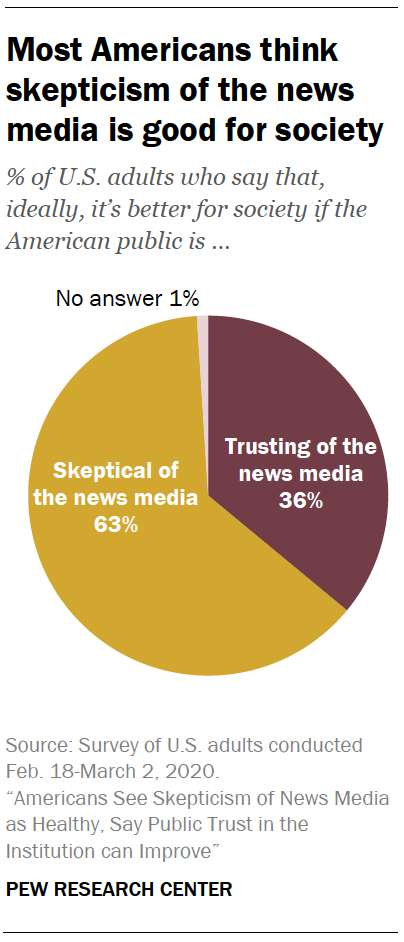
What may in part explain these often negative or split views is a prominent sense that skepticism of the news media can be healthy.
Roughly two-thirds of Americans (63%) think that, ideally, it is better for society if the public is skeptical of the news media. This is far higher than the portion who say it is better if the public is trusting of the news media (36%).
Not only do Republicans largely feel that skepticism of the news media is a good thing, but a majority of Democrats also feel this way (see Chapter 4).
Quote from focus groups:
“You don’t want to not trust them [the news media] no matter what, but you don’t want to be on the other side and trust a news organization 100% of the time.” – Man, 34
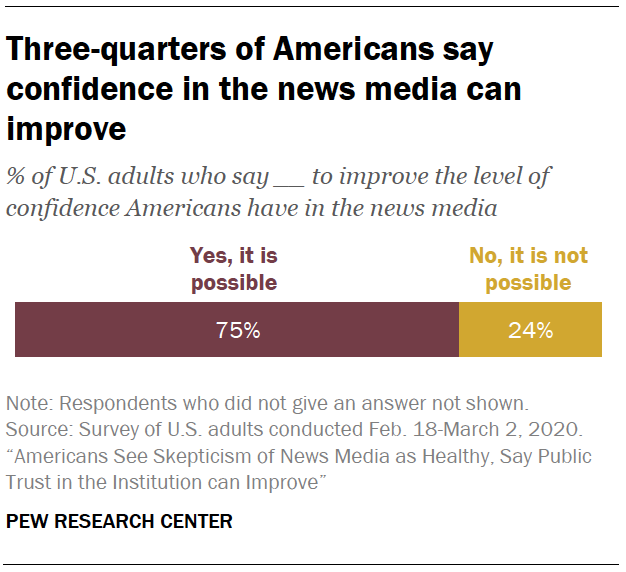 Americans, however, also see plenty of room for sentiments toward the news media to become more positive. Three-quarters of Americans say it is possible for the public to increase its level of confidence in the news media, compared with about a quarter (24%) who say it is not possible. This view is largely shared by both major parties, as well as across demographic groups.
Americans, however, also see plenty of room for sentiments toward the news media to become more positive. Three-quarters of Americans say it is possible for the public to increase its level of confidence in the news media, compared with about a quarter (24%) who say it is not possible. This view is largely shared by both major parties, as well as across demographic groups.
The view that confidence in the media could increase also is common among both those who say that, in an ideal world, the public would be trusting of the news media (85%) and those who say it is better for society to be skeptical of journalists (69%). This suggests that even if views of the news media become more positive, many still think it is important to maintain some level of healthy skepticism.
The sense that confidence can increase lines up with how Americans feel about other institutions and each other. In 2018, large majorities said it is possible to increase the level of confidence in the federal government as well as in other Americans.
The news media get fairly good marks at covering specific issues and events
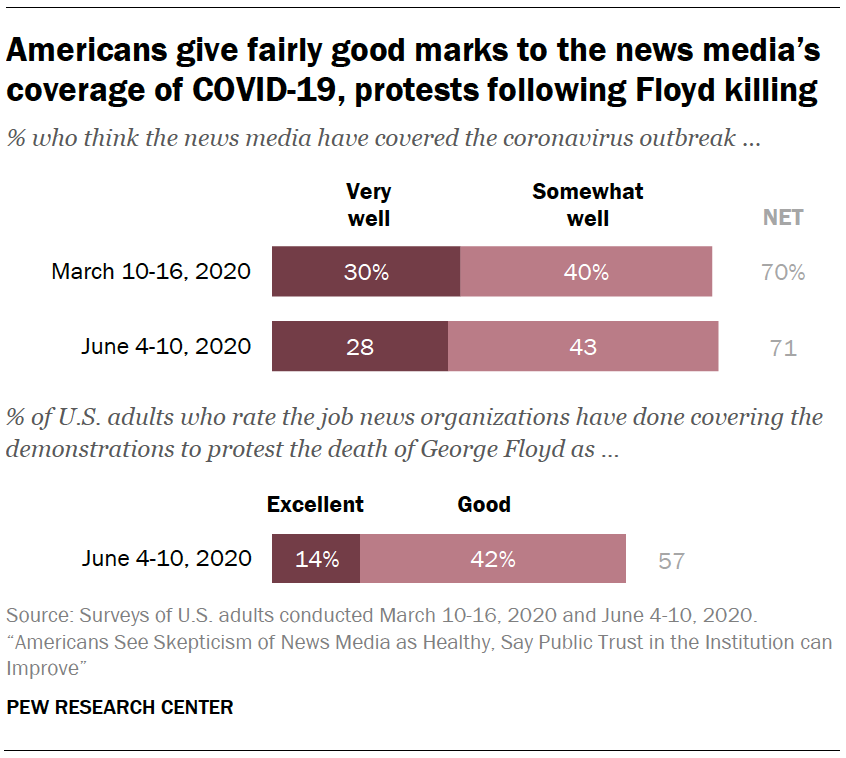 While the public holds many concerns about the news media broadly, views are somewhat more positive about news coverage of a range of specific issues and events, including recent ones.
While the public holds many concerns about the news media broadly, views are somewhat more positive about news coverage of a range of specific issues and events, including recent ones.
Previous Pew Research Center studies have shown that about seven-in-ten Americans say the news media have done “very” or “somewhat” well covering the coronavirus outbreak, and more than half (57%) say news organizations have done an “excellent” or “good” job covering the protests following the police killing of George Floyd.
This is similar to views of other specific issues and events. For example, the public has thought highly of the news media’s coverage of other crises, such as the war against terrorism immediately after 9/11. And Americans also have expressed somewhat positive views about coverage of specific science news topics, such as childhood vaccines.


